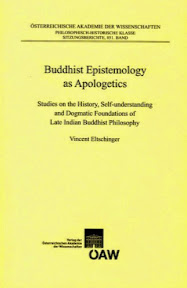Eltschinger: Buddhist Epistemology as Apologetics
Eltschinger, Vincent:
Buddhist Epistemology as Apologetics : Studies on the History, Self-understanding and Dogmatic Foundations of Late Indian Buddhist Philosophy / Vincent Eltschinger. - Wien : Verlag der Österreichischen Akademie der Wissenschaften, 2014. - x, 436 S. - (Sitzungsberichte / Österreichische Akademie der Wissenschaften, Philosophisch-Historische Klasse ; 851) (Beiträge zur Kultur- und Geistesgeschichte Asiens ; 81)
ISBN 978-3-7001-7583-4
EUR 66,00
DDC: 181.043
Beschreibung
This book deals first with the historical and doctrinal foundations of Dharmakīrti’s religious philosophy. It points to a socio-historical context of Brahmanical hostility toward non- and anti-Vedic denominations (chapter 1), new patterns of Buddhist self-diction (chapter 2), reinvented models of theoretical and apologetical rationality (chapter 3), and the dogmatic infrastructure underlying Buddhist epistemology (chapter 4). It argues that Buddhist “Tantrism” and Buddhist “logic,” two roughly contemporary phenomena that can be regarded as the main literary outcomes of the “early medieval” period, share interesting features in terms of polemical targets and self-understanding. Since the end of the fifth century, intra-Buddhist polemics have become less relevant (at least in the form it had had heretofore) and partly receded into the background in favor of inter- or cross-confessional controversies. Departing from Abhidharma and addressing new, predominantly non-Buddhist targets resulted in the abandonment of scholastic, confession-specific terminology and methods as well as the development of new models of theoretical and apologetical rationality: first, the construction of a clear-cut concept of reason(ing) as opposed to scripture; second, the gradual constitution of a concept of practical rationality that served the apologetic purpose of defending the very possibility, or rationality, of the Buddhist path. Finally, the book examines the extent to which Buddhist epistemology can be said to be Buddhist at all as regards its deeper doctrinal structure. It attempts to interpret the foundations of Buddhist epistemology – the apoha theory, the doctrine of the pramāṇas, etc. – as a rationalization and an apologetically updated version of Buddhist dogmas on the structure of ultimate and conventional realities, on the cognitive bases of error and its elimination, and on the cintāmayī prajñā (“insight born of reflection”) as a salvific means of a predominantly inferential order. [Verlagsinformation]
Inhalt
Foreword. ix
Introduction: On Critical Examination and Apologetics. 1
1. Apocalypticism, Heresy and Philosophy. 35
1.1 Introduction. 35
1.2 Mleccha and pāṣaṇḍa / pāṣaṇḍin in Brahmanical Apocalypticism. 40
1.3 Indian Buddhist Apocalypticism. 73
2. Buddhist Esoterism and Epistemology. 93
2.1 Introduction. 93
2.2 Śaivism, Early Medieval India and the Rise of Buddhist Tantrism. 96
2.3 Buddhist Epistemology. 154
2.4 Conclusion. 189
3. Turning Hermeneutics into Apologetics. 191
3.1 Introduction. 191
3.2 Evaluative Rationality. 193
3.3 Practical Rationality. 219
3.4 Conclusion. 244
4. Nescience, Epistemology and Soteriology. 247
4.1 Introduction. 247
4.2 Nescience as Erroneous Cognition (mithyopalabdhi). 248
4.3 Nescience as Personalistic False View (satkāyadṛṣṭi). 266
4.4 Nescience, Inference, and the Path toward Salvation. 293
Abbreviations and Bibliography. 329
Indices. 371
Autor
VINCENT ELTSCHINGER is research fellow at the Austrian Academy of Sciences and a guest professor at various universities. Profile page.
Quellen: Verlag der Österreichischen Akademie der Wissenschaften; Österreichische Akademie der Wissenschaften; WorldCat; Österreichische Nationalbibliothek; Bookbutler; Buchhandel.de
Bildquelle: Verlag der Österreichischen Akademie der Wissenschaften
Bibliographie: [1]
References
- (2014). Buddhist Epistemology as Apologetics: Studies on the History, Self-understanding and Dogmatic Foundations of Late Indian Buddhist Philosophy. Sitzungsberichte / Österreichische Akademie der Wissenschaften, Philosophisch-Historische Klasse; 851. x, 436 S.
Ähnlich
- Franco/Notake: Dharmakīrti on the Duality of the Object
- Moriyama: Omniscience and Religious Authority
- Sthiramati's Pañcaskandhakavibhāṣā
- Park: Vasubandhu, Śrīlāta, and the Sautrāntika Theory of Seeds
- Carpenter: Indian Buddhist Philosophy
- The Foundation for Yoga Practitioners
- Companion to Buddhist Philosophy
- dBu ma tshig gsal gyi ti ka (Part 1)
- Higgins: The Philosophical Foundations of Classical rDzogs chen in Tibet
- Eltschinger/Ratié: Self, No-Self, and Salvation

